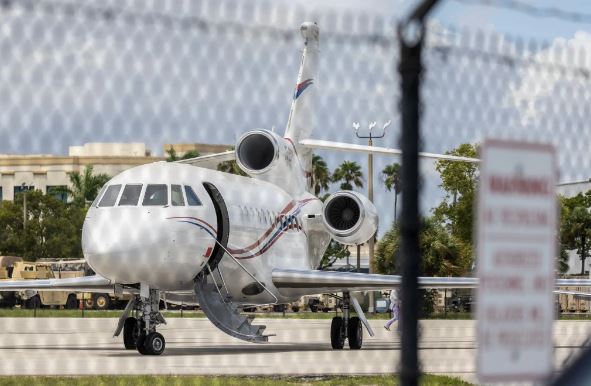The U.S. government has seized an airplane linked to Nicolás Maduro, the controversial leader of Venezuela, in a move aimed at increasing pressure on him. The plane was brought to Florida on Monday after being confiscated because it was bought in violation of U.S. sanctions, according to a statement from the Justice Department. This action is part of the Biden administration’s broader strategy to hold Maduro accountable for his alleged efforts to undermine the results of the recent presidential election in Venezuela.
The seized aircraft, a Dassault Falcon 900EX, had been owned and operated by Maduro and his associates. It was intercepted while undergoing maintenance in the Dominican Republic before being flown to Florida. According to U.S. Attorney General Merrick B. Garland, the plane had been purchased in the United States for $13 million through a shell company and was later “smuggled” out of the country to be used by Maduro and his close associates. The Justice Department’s investigation revealed that the plane was illegally exported to Venezuela in violation of U.S. sanctions, specifically an executive order signed by President Donald J. Trump in 2019 restricting trade with Venezuela.
The operation was a coordinated effort involving several U.S. government agencies, including the Justice Department, the Department of Homeland Security, and the Department of Commerce. The agencies worked together to intercept and seize the aircraft, with the Dominican Republic also playing a key role by assisting in the operation. The plane was seized at the Dr. Joaquín Balaguer International Airport, also known as La Isabela International Airport, after officials in Venezuela had brought it to the Dominican Republic for maintenance.
The timing of the plane’s seizure aligns with growing tensions between the U.S. and Maduro’s government over the outcome of Venezuela’s recent presidential election. The Biden administration has accused Maduro of attempting to cling to power by disregarding evidence that his opponent, Edmundo González, had won the election held on July 28. Secretary of State Antony J. Blinken publicly declared the U.S.’s recognition of González as the legitimate winner on August 1, stating, “We congratulate Edmundo González Urrutia on his successful campaign.
In contrast, a Venezuelan court aligned with Maduro issued an arrest warrant for González on Monday. The warrant, issued by a court responsible for handling “crimes associated with terrorism,” accuses González of conspiracy, usurping power, and sabotage, among other charges. This move signals that Maduro’s regime is determined to suppress opposition and maintain control, despite international condemnation.
Maduro has long been critical of U.S. influence in Latin America, accusing the U.S. government of exercising imperial power over the region. In response to the U.S. seizure of the plane and the recognition of González as Venezuela’s rightful president, Maduro has framed these actions as further evidence of what he sees as U.S. interference in Venezuelan affairs.
The White House, however, stands by its assessment of the election results. In a statement from the National Security Council, a U.S. official pointed out that Maduro’s claims of electoral victory lack credibility. “Last week, one of Venezuela’s own National Electoral Council rectors further validated that Maduro has provided no evidence that he won this election,” the statement said. The U.S. government, working in coordination with international partners, continues to push for the recognition of the will of the Venezuelan people as expressed in the July 28 election.
The plane seizure is just one example of how the U.S. government is tightening sanctions on Venezuela. The Justice Department has revealed that people connected to Maduro used a Caribbean-based shell company to purchase the Dassault Falcon jet from a Florida company in late 2022 and early 2023. The plane was illegally exported to Venezuela via the Caribbean in April 2023 and has since been used primarily for travel between Venezuela and military bases, often transporting Maduro himself.
The U.S. government, through this high-profile seizure and its broader strategy of sanctions, aims to demonstrate that it will not tolerate violations of export controls and sanctions designed to prevent Maduro and his allies from benefiting from international trade. As tensions between the two nations continue to escalate, the Biden administration is using every available tool to increase pressure on Maduro while seeking to support Venezuela’s democratic forces in their push for a peaceful transition of power.

